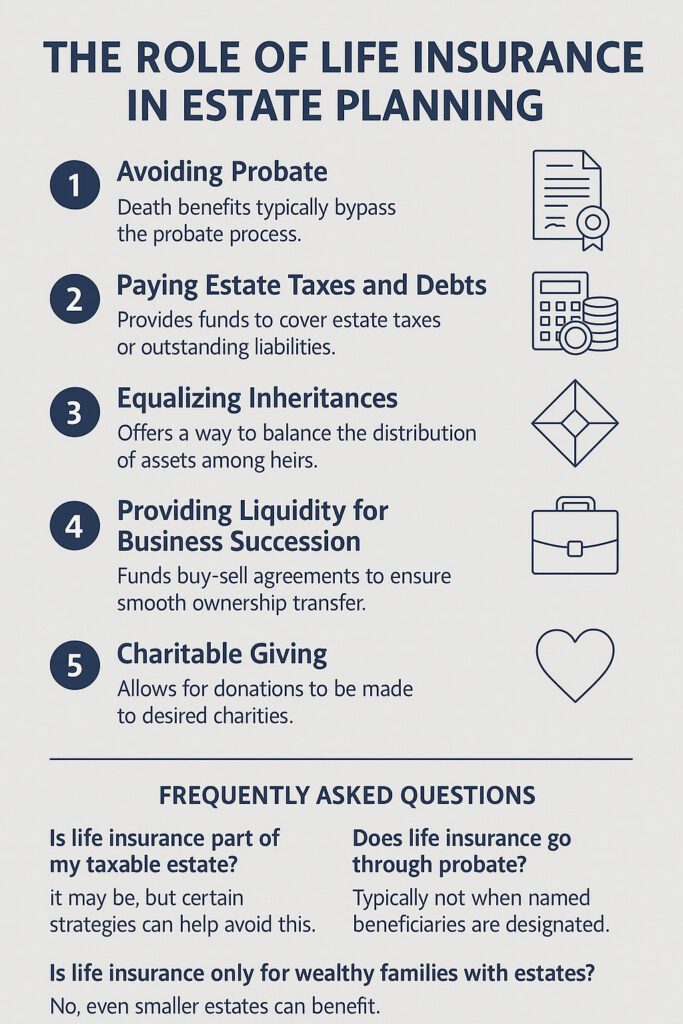The Role of Life Insurance in Estate Planning

When people think about life insurance, they often focus on income replacement or protecting loved ones after death. But life insurance is also one of the most effective estate planning tools available. It can provide liquidity, equalize inheritances, and ensure your legacy is carried out as you intended.
This Life Insurance Awareness Month, let’s explore how life insurance fits into a well-rounded estate plan.
Why Estate Planning Matters
Estate planning isn’t just for the wealthy—it’s about making sure your assets are transferred smoothly, fairly, and with as little stress as possible. Without proper planning, heirs may face delays, legal costs, or even disputes. Life insurance offers a unique way to simplify this process.
How Life Insurance Supports Estate Planning
1. Avoiding Probate
Death benefits typically pass directly to named beneficiaries, bypassing probate court. This means your loved ones receive funds faster and without the costs and delays of probate proceedings.
2. Paying Estate Taxes and Debts
For larger estates, life insurance can provide immediate cash to cover federal or state estate taxes. It can also pay off debts so heirs don’t have to liquidate property or investments at an inopportune time.
3. Equalizing Inheritances
Families with businesses, farms, or real estate often face the challenge of fairly dividing assets. Life insurance can be used to provide cash to heirs who don’t receive property, ensuring fairness without forcing a sale.
4. Providing Liquidity for Business Succession
In family-owned businesses, a life insurance policy can fund buy-sell agreements, helping surviving owners purchase a deceased partner’s share. This ensures continuity and protects the company’s value.
5. Charitable Giving
Policies can also be structured to benefit charities, allowing you to leave a meaningful legacy beyond your family.
Example Scenario
Imagine a family farm passed down through generations. One child works the farm; the others do not. Rather than selling the property, the parents purchase a life insurance policy. Upon their passing, the farming child inherits the land, while the death benefit provides equal value to the other children. The legacy is preserved, and fairness is maintained.
Life Insurance, Trusts, and ILITs
For high-net-worth individuals, placing a policy inside an Irrevocable Life Insurance Trust (ILIT) can keep the death benefit outside of the taxable estate. This ensures beneficiaries receive the full value without additional estate tax burdens.

Frequently Asked Questions About Life Insurance and Estate Planning
Is life insurance part of my taxable estate?
Yes, if you own the policy at the time of your death, the death benefit may be included in your estate for tax purposes. Large estates that exceed the federal or state exemption limits could face estate taxes. To avoid this, some people use an Irrevocable Life Insurance Trust (ILIT).
Does life insurance go through probate?
Usually not. When you name specific beneficiaries on your policy, the proceeds go directly to them, bypassing probate court. However, if you name your estate as the beneficiary, the funds may be subject to probate.
Can life insurance help pay estate taxes?
Yes. For families with significant assets, life insurance can provide immediate cash to cover estate taxes and settlement costs—without forcing heirs to sell property or investments.
What’s the benefit of using life insurance for inheritance equalization?
Life insurance can provide cash to heirs who don’t inherit physical assets, like a family business or farm. This helps ensure fairness without requiring a sale of those assets.
Is life insurance only for wealthy families with estates?
Not at all. Even smaller estates can benefit from life insurance. It helps cover final expenses, pay off debts, and transfer assets efficiently to loved ones.
Final Thoughts
Life insurance does more than protect income—it protects your legacy. Whether your goal is avoiding probate, covering estate taxes, or ensuring fairness among heirs, it’s a versatile tool in estate planning.
This Life Insurance Awareness Month, review your estate plan to see how life insurance can help safeguard your family’s future.
🧑💼 Written by Brent Meyer, founder of SafeMoney.com. With more than 20 years of hands-on experience in annuities and retirement planning, Brent is committed to helping Americans make informed, confident financial decisions.
Disclaimer: The information in this article is for educational purposes only and should not be considered financial, tax, or legal advice. Life insurance products and estate planning strategies vary by state and situation. Consult with a licensed financial professional and qualified estate planning attorney before making decisions.








